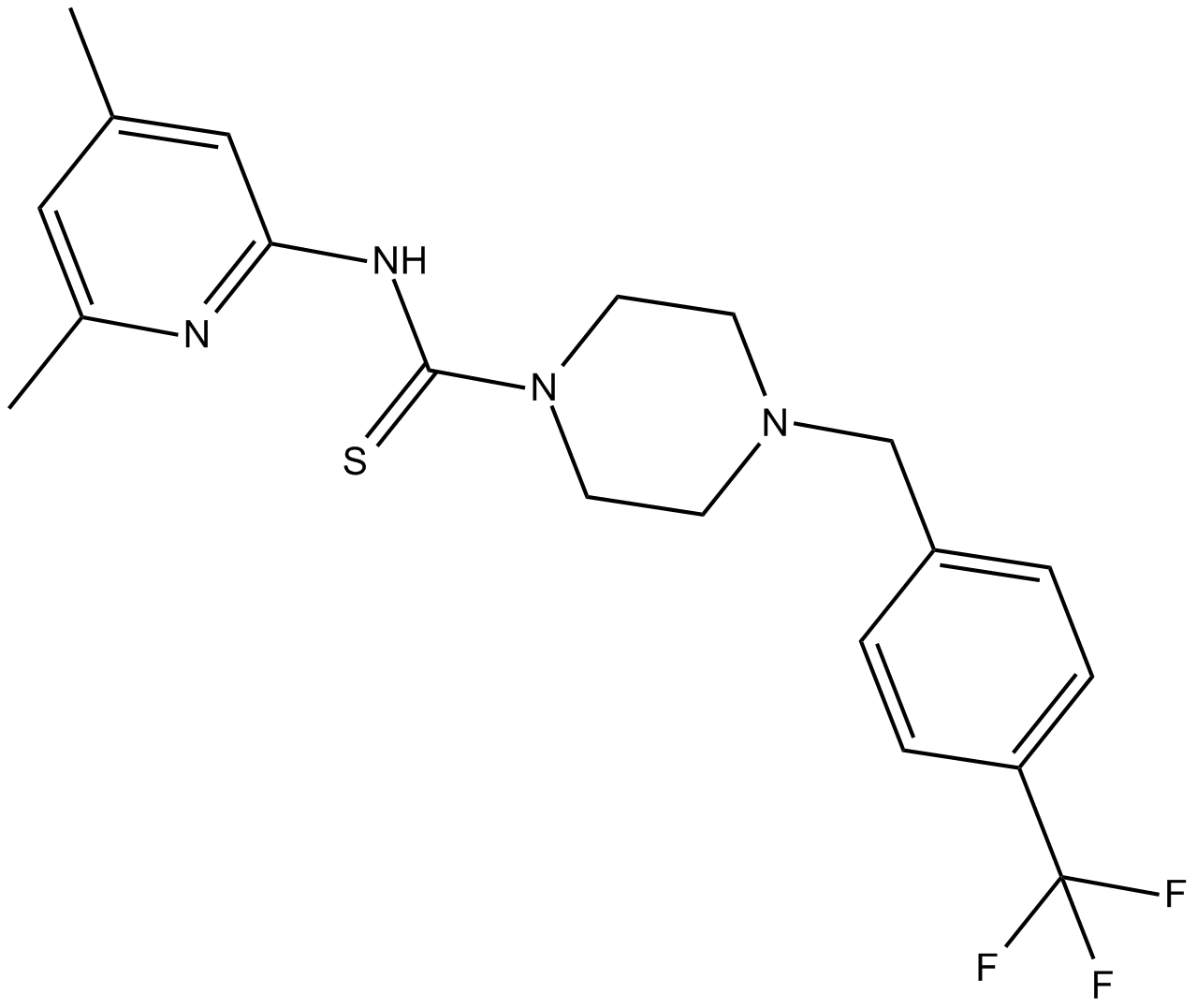NCT-503 |
| Catalog No.GC15943 |
NCT-503 is a phosphoglycerate dehydrogenase (PHGDH) inhibitor with an IC50 of 2.5 ?M
Products are for research use only. Not for human use. We do not sell to patients.

Cas No.: 1916571-90-8
Sample solution is provided at 25 µL, 10mM.
NCT-503 is a phosphoglycerate dehydrogenase (PHGDH) inhibitor with an IC50 of 2.5 µM[1]
Treatment of three PHGDH-independent cell lines and five PHGDHdependent cell lines with NCT-503 demonstrated that NCT-503 had EC50 values of 8-16 μM for the PHGDH-dependent cell lines, and no toxicity toward other PHGDH-independent cell lines [1]. When determined the GI50 of NCT-503 in the MHCC97L cell line and found that treatment of NCT-503 significantly reduced the relative ratio of NADPH/NADP+ in cells. NCT-503 could double the number of the apoptotic cells induced by Sorafenib[2]
Primary MM cells are sensitive to doses of the PHGDH inhibitor NCT-503, that are tolerated by PBMCs[4].PHGDH level was significantly increased in the lung adenocarcinoma PC9ER4 cells that acquired resistance to erlotinib. Perturbation of PHGDH by NCT-503, augmented the tumoricidal effect and restored sensitivity to erlotinib in cell lines and xenografts. ROS stress and DNA damage marker γH2AX were enhanced by NCT-503 [3].The combination treatment of NCT-503 and Physcion substantially inhibited hepatocellular carcinoma growth in vitro and in vivo[7]
In mice, NCT-503 exhibits favorable absorption, distribution, metabolism and excretion (ADME) properties. NCT-503 has good exposure, half-life (2.5 hr) and Cmax (20 uM in plasma) following intraperitoneal administration with significant partitioning into the liver and brain. NCT-503 treatment reduces the growth and weight of PHGDH-dependent MDA-MB-468 xenografts but does not affect the growth or weight of PHGDH-independent MDA-MB-231 xenografts[1].In C57BL/KaLwRij mice were injected with 5T33MM cells model, NCT-503 treatment did not reduce tumor load at the doses used but reduced tumor growth in combination with bortezomib[4,5].Adding NCT-503 to the diet of mice increased body weight and liver weight, and increased triglyceride content in liver. NCT-503 supplementation significantly inhibited PHGDH activity and decreased the serine content in the liver[6].Treatment of murine and human lung fibroblasts with NCT-503 decreased TGF-β-induced collagen protein synthesis. Mice treated with the PHGDH inhibitor NCT-503 beginning 7 days after intratracheal instillation of bleomycin had attenuation of lung fibrosis[8]
References:
[1]: Pacold ME, Brimacombe KR, et,al. A PHGDH inhibitor reveals coordination of serine synthesis and one-carbon unit fate. Nat Chem Biol. 2016 Jun;12(6):452-8. doi: 10.1038/nchembio.2070. Epub 2016 Apr 25. Erratum in: Nat Chem Biol. 2016 Jul 19;12 (8):656. PMID: 27110680; PMCID: PMC4871733.
[2]: Wei L, Lee D, et,al. Genome-wide CRISPR/Cas9 library screening identified PHGDH as a critical driver for Sorafenib resistance in HCC. Nat Commun. 2019 Oct 15;10(1):4681. doi: 10.1038/s41467-019-12606-7. PMID: 31615983; PMCID: PMC6794322.
[3]: Dong JK, Lei HM, et,al. Overcoming erlotinib resistance in EGFR mutation-positive lung adenocarcinomas through repression of phosphoglycerate dehydrogenase. Theranostics. 2018 Feb 12;8(7):1808-1823. doi: 10.7150/thno.23177. Erratum in: Theranostics. 2021 Feb 9;11(8):3963. PMID: 29556358; PMCID: PMC5858502.
[4]: Elsaadi S, Steiro I, et,al. Targeting phosphoglycerate dehydrogenase in multiple myeloma. Exp Hematol Oncol. 2021 Jan 4;10(1):3. doi: 10.1186/s40164-020-00196-w. PMID: 33397437; PMCID: PMC7784327.
[5]: Dong JK, Lei HM, et,al. Overcoming erlotinib resistance in EGFR mutation-positive lung adenocarcinomas through repression of phosphoglycerate dehydrogenase. Theranostics. 2018 Feb 12;8(7):1808-1823. doi: 10.7150/thno.23177. Erratum in: Theranostics. 2021 Feb 9;11(8):3963. PMID: 29556358; PMCID: PMC5858502.
[6]: He L, Liu Y, et,al. Exogenous and Endogenous Serine Deficiency Exacerbates Hepatic Lipid Accumulation. Oxid Med Cell Longev. 2021 Oct 19;2021:4232704. doi: 10.1155/2021/4232704. PMID: 34712382; PMCID: PMC8548146.
[7]: Dewdney B, Alanazy M, et,al. The effects of fructose and metabolic inhibition on hepatocellular carcinoma. Sci Rep. 2020 Oct 7;10(1):16769. doi: 10.1038/s41598-020-73653-5. PMID: 33028928; PMCID: PMC7541473.
[8]:Hamanaka RB, Nigdelioglu R, et,al. Inhibition of Phosphoglycerate Dehydrogenase Attenuates Bleomycin-induced Pulmonary Fibrosis. Am J Respir Cell Mol Biol. 2018 May;58(5):585-593. doi: 10.1165/rcmb.2017-0186OC. PMID: 29019702; PMCID: PMC5946329
Average Rating: 5 (Based on Reviews and 32 reference(s) in Google Scholar.)
GLPBIO products are for RESEARCH USE ONLY. Please make sure your review or question is research based.
Required fields are marked with *




















